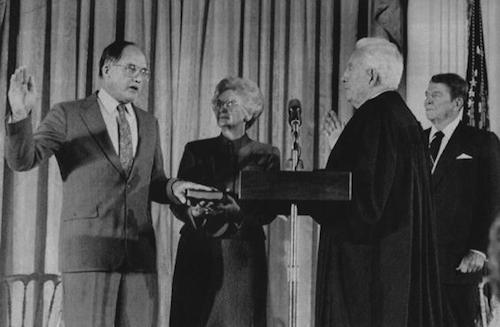In 2003, Ruth Bader Ginsberg described William Rehnquist’s feminist turn as “such a delightful surprise.” Maybe he suddenly decided that combating pervasive gender discrimination trumped states’ rights, or maybe his daughter had just become a single mom. The second explanation would comport with a new study out of the University of Rochester, which found that “judges with daughters consistently vote in a more feminist fashion on gender issues than judges who have only sons.” The effect is especially pronounced among Republican appointments.
We should maybe not elevate this one study to a law of nature just yet, but it suggests some fun lines of inquiry. For example, is the idea that judges decide cases based on their dispassionate interpretations of the law just a pleasing fantasy?
Generally speaking, there are three ways to judge something:
- analytically, based on unbiased application of rules and principles,
- instrumentally, arriving at whatever decision will most benefit you, and
- viscerally, by going with what you feel.
Method (1) is what we want from our appellate court justices. The idea behind the judicial branch is not that it will cast the tie-breaking vote in contests between the parties, but that it will apply the law as written with a clarity and impartiality that legislators and executives cannot muster. Of course, judges are political appointments, and they easily can be said to be conservative or liberal. But even these labels ostensibly describe their good-faith interpretations of the law, not their instrumental agendas.
In practice, though, a judge’s consistent interpretation of the law can be a stalking horse for his consistent biases. Consider Antonin Scalia. He is widely regarded as a strong defender of free speech, even going so far as to let a Jedi negotiate with him in open court. But Scalia’s decisions in favor of free speech are also decisions in favor of conservative speakers 65% of the time. Only 21% of his pro-speech rulings went in favor of liberals.
In this context, Scalia’s approach looks more like method (3), with rules and principles applied during the explanation phase. We cannot know how he really thinks, but it seems plausible that he might have an intuitive sense of who the good guys and the bad guys are in a given case, and he looks for law to support the people who deserve to win.
The findings of the Rochester study comport with that explanation. If having a daughter correlates with ruling in favor of feminist concerns, might it be because said daughter shifts your visceral understanding of who is on your team? And if we accept that possibility, what does it imply about our own value systems?
I would like to think that my judgments are rooted in a coherent system, but maybe, to paraphrase Sartre, the existence of my choices precedes their essence. I like indie bands, justice for poor kids and Fedor Emelianenko, in theory because these things comport with my values. But maybe my values comport with the things I viscerally like.
This possibility may not significantly impact the function of our decisions, but it has scary implications for their authority. Since about 1687, we have considered the logical application of explicit principles a sounder foundation for argument than, say, whatever the hell you feel. Our judgments are better when they proceed from systematically applied values. But if they are merely justified by those values, and emerge ex nihilo or from forces beyond our consciousness or control, how can they enjoy authority?
The cynical position is that they are arbitrary, and it doesn’t matter. The authority of Scalia’s judgments comes not from the validity of his logic but from the power of his position. That’s unsatisfying, though. Americans like to see our power justified, and the best justification is the rule of law—in the judiciary and in our own internal calculus.
If the difference in a landmark women’s rights ruling is how many justices have daughters, the American judicial system loses some of its patina. It’s nice that it can still reach good decisions for bad reasons, but it would be nicer if its motives were pure. Maybe that’s impossible, though. Maybe, like heaven, our idea of a good system of judgment is built precisely on what we don’t have here.





And we arrive at post-modernism. Function follows form and we’re all bullshit, but like, what next?
I submit that as we better understand the neurological basis (in your post the psychological basis) of moral or analytical thinking, we will lean more heavily on distributed intelligence and free-choice systems as the basis of authority. As the facade fades that intelligent, dispassionate people can interpret things fairly we will need new mechanisms on which to base our sense of justice.
We’re already there with a democratically controlled Congress which can override anything a Justice decides through new laws, and also the free-choice mechanism for most goods we call a “market.” But in the future I see that becoming codified instead of the default go-to for what is right. Presently, we rely on markets and democracy for the majority of our decisions, but do not fully embrace the tyranny of the majority in our rhetoric. Reddit and Google will change that–with super-individualized solutions that derive their authority from distributed intelligence. In the Reddit-Google future, the decision a judge makes will be moot because the law he interprets will be individualized.